牛津英语8Bunit1重点知识归纳(经典)
新版牛津译林8B_Unit1单词词组和语法讲解
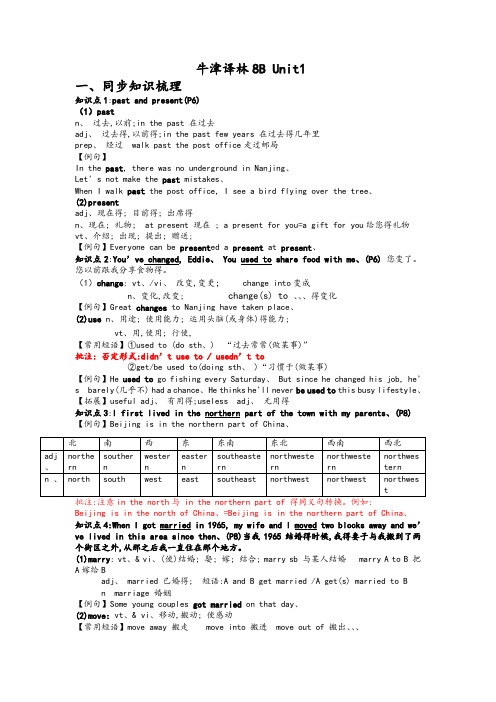
牛津译林8B Unit1一、同步知识梳理知识点1:past and present(P6)(1)pastn、过去,以前;in the past 在过去adj、过去得,以前得;in the past few years 在过去得几年里prep、经过 walk past the post office走过邮局【例句】In the past, there was no underground in Nanjing、Let’s not make the past mistakes、When I walk past the post office, I see a bird flying over the tree、(2)presentadj、现在得; 目前得; 出席得n、现在; 礼物; at present 现在 ; a present for you=a gift for you给您得礼物vt、介绍; 出现; 提出; 赠送;【例句】Everyone can be present ed a present at present、知识点2:You’ve changed, Eddie、 You used to share food with me、(P6) 您变了。
您以前跟我分享食物得。
(1)change: vt、/vi、改变,变更; change into变成n、变化,改变; change(s) to 、、、得变化【例句】Great changes to Nanjing have taken place、(2)use n、用途; 使用能力; 运用头脑(或身体)得能力;vt、用,使用; 行使,【常用短语】①used to (do sth、) “过去常常(做某事)”批注: 否定形式:didn’t use to / usedn’t to②get/be used to(doing sth、 )“习惯于(做某事)【例句】He used to go fishing every Saturday、 But since he changed his job, he’s barely(几乎不) had a chance、 He thinks he’ll never be used to this busy lifestyle、【拓展】useful adj、有用得;useless adj、无用得知识点3:I first lived in the northern part of the town with my parents、(P8) 【例句】Beijing is in the northern part of China、Beijing is in the north of China、=Beijing is in the northern part of China、知识点4:When I got married in 1965, my wife and I moved two blocks away and we’ve lived in this area since then、(P8)当我1965结婚得时候,我得妻子与我搬到了两个街区之外,从那之后我一直住在那个地方。
8BUnit1知识点归纳

14. factory a place where things are made by machines 工厂 (factories)
a steel/car factory 一家钢铁/汽车厂 two shoe factories 两家鞋厂
15. waste 废料;废品浪费
The knife is used for cutting apples. be/become/get used to sth习惯于某事, be/become/get used to doing sth习惯于做某事
Tom is used to getting up early. Tom习惯于早起。
The old man isn’t used to the city life. 这个老人不习惯城市生活。
He used to get up late, so he isn’t used to getting up early. 他过去经常起的晚,所以他不习惯早起
The life we were used to has changed a lot. 我们过去习惯了的生活已经改变了许多。
5. since 自…以来
1. past 名词过去 2. In the past 在过去
3. There was a cinema in this area in the past. 4. 过去这儿有一个电影院。 5. In the past two years在过去的两年中(用于完成
时)
6. Great changes have taken place in my hometown in the past two years.
18. situation 形势,情况
英语初中牛津版8bunit1重要知识点归纳

英语初中牛津版8bunit1重要知识点归纳一.【精选词汇】㈠重点短语1.thechangestoSunshineTown阳光镇的变化→thechangesto……的变化(p8) 〈知识链接〉changen.变化,常用复数changes。
e.g.Greatchangeshavetakenplacesince1995.2.inthesouthernpartoftown→inthesouthernpartof…在…的南部→south→southern〈知识链接〉east东部→eastern东部的,west→western,north→northern 3.inthepast在过去→atpresent现在→inthefuture以后;今后,注意这些短语中的介词和冠词。
4.turntheplaceintoapark→turn…into…把…变成…〈知识链接〉①Heatturnswaterintovapor.热使水变成蒸气。
②TurnthissentenceintoEnglish.5.playcardsandChinesechess打牌、下象棋, e.g.It’spleasanttoplaycardsandChinesechess.6.waterpollution水污染→airpollution空气污染,noisepollution噪音污染(p9)〈知识链接〉Waterpollutionwasaproblembefore.edtodumpitswasteintowater→usedtodosth过去常做某事,注意否定式、疑问式的形式〈知识链接〉⑴usedtodosth→否定式usednottodosth或didn’tusetodosth→疑问式Didsbusetodosth?或Usedsbtodosth?⑵Therebe和usedto合用的形式为Thereusedtobe。
依照要求进行句型转换:Sheusedtoteachhistory.①否定式:Sheusedteachhistory.或Shedidn’tteachhistory.②疑问式:sheteachhistory?或Didsheteachhistory?〈用法拓展〉⑴beusedtodosth=beusedfordoingsth被用于做某事,e.g.Stampsareusedtosendletters.=Stampsareusedforsendingletters.⑵be/become/getusedtosth适应于某事,be/become/getusedtodoingsth适应于做某事, e.g.①Mygrandmausedtoliveinthecitybutnowshehasgotusedtothecountrylife.②Tomisusedtogettingupearly.8.insomeways在某种程度上;在某些方面→inthisway以这种方式9.feelabitlonelyfromtimetotime→fromtimetotime=attimes=sometimes有时;不时地〈知识链接〉⑴abit+形容词原级或比较级=alittle+形容词原级或比较级,有点…⑵abitof+不可数名词=alittle+不可数名词 e.g.abitofwater=alittlewater〈用法拓展〉notalittle=very特别,notabit=not…atall一点也不10.throwaway扔掉…→“动词+副词”结构,e.g.throwit/themaway11.haveaninterviewwithsb=interviewsb采访某人;对某人面试;与某人面谈(p12)〈知识链接〉①Myparentshavehadaninterviewwithmyteacher.②Theyinterviewed20peopleforthejob.③Thereareanumberofinterviewswithsomefamousfootballplayers.12.thebestmodelIhaveeverseen我曾见过的最好的模型(p17)〈知识链接〉the+形容词最高级+名词单数+sbhave/haseverdone,某人曾做过的最…的…themostwonderfulfilm(that)hehaseverwatched他看过的最精彩的竞赛〈用法拓展〉⑴ever通常用于疑问句中或否定句中。
牛津英语8B Unit1重点知识总结
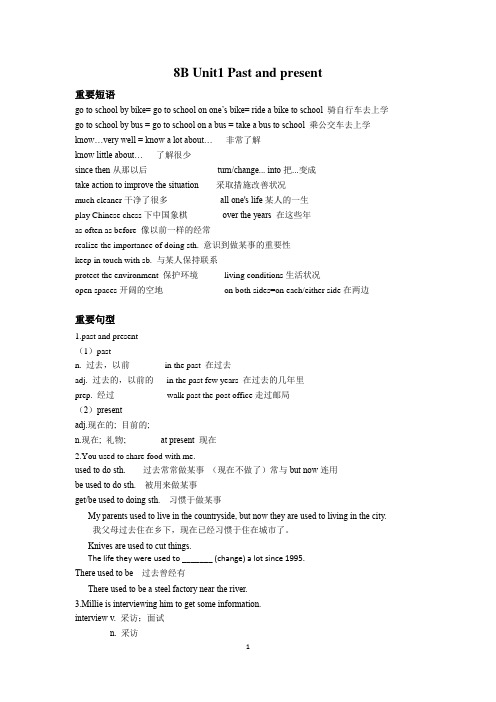
8B Unit1 Past and present重要短语go to school by bike= go to school on one’s bike= ride a bike to school 骑自行车去上学go to school by bus = go to school on a bus = take a bus to school 乘公交车去上学know…very well = know a lot about… 非常了解know little about… 了解很少since then从那以后turn/change... into把...变成take action to improve the situation 采取措施改善状况much cleaner干净了很多all one's life某人的一生play Chinese chess下中国象棋over the years 在这些年as often as before 像以前一样的经常realize the importance of doing sth. 意识到做某事的重要性keep in touch with sb. 与某人保持联系protect the environment 保护环境living conditions生活状况open spaces开阔的空地on both sides=on each/either side在两边重要句型1.past and present(1)pastn. 过去,以前in the past 在过去adj. 过去的,以前的in the past few years 在过去的几年里prep. 经过walk past the post office走过邮局(2)presentadj.现在的; 目前的;n.现在; 礼物; at present 现在2.You used to share food with me.used to do sth. 过去常常做某事(现在不做了)常与but now连用be used to do sth. 被用来做某事get/be used to doing sth. 习惯于做某事My parents used to live in the countryside, but now they are used to living in the city.我父母过去住在乡下,现在已经习惯于住在城市了。
牛津初中英语8B Unit1单元知识点复习
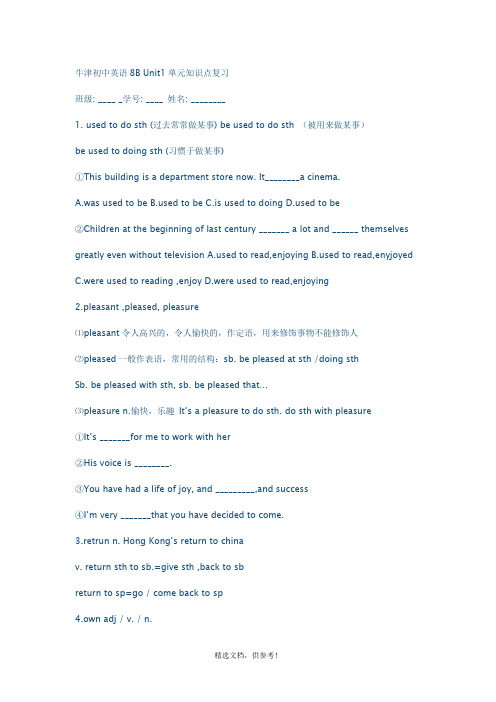
牛津初中英语8B Unit1单元知识点复习班级: ____ _学号: ____ 姓名: ________1. used to do sth (过去常常做某事) be used to do sth (被用来做某事)be used to doing sth (习惯于做某事)①This building is a department store now. It________a cinema.A.was used to beed to beC.is used to doinged to be②Children at the beginning of last century _______ a lot and ______ themselves greatly even without television ed to read,enjoying ed to read,enyjoyedC.were used to reading ,enjoyD.were used to read,enjoying2.pleasant ,pleased, pleasure⑴pleasant令人高兴的,令人愉快的,作定语,用来修饰事物不能修饰人⑵pleased一般作表语,常用的结构:sb. be pleased at sth /doing sthSb. be pleased with sth, sb. be pleased that…⑶pleasure n.愉快,乐趣It’s a pleasure to do sth. do sth with pleasure①It’s _______for me to work with her②His voice is ________.③You have had a life of joy, and _________,and success④I’m very _______that you have decided to come.3.retrun n. Hong Kong’s return to chinav. return sth to sb.=give sth ,back to sbreturn to sp=go / come back to sp4.own adj / v. / n.①This is /his _______house (自已的)=This house is his________②他父亲有一面大镜子。
牛津译林八年级下册8BUnit1 知识梳理

牛津译林八年级下册8BUnit1 知识梳理一、重点词汇:1. 时态标志词:一般现在时:from time to time=at times一般过去时:in the past现在进行时:at present现在完成时:in/during/over the past/last XX years / just /since /ever /over the years before (在句末,副词) yet recently重要考点:1) already, yet, just区别already, just只能用于肯定句,yet用于否定句和疑问句just只能放在have和done中间,already可以放在have和done中间或句末,yet只能放在句末。
2) since和for的区别,since的用法since+过去时间点;since+时间段 ago;since+从句(一般过去时) ;since doingIt is 时间段 since+从句for+时间段(注意时态未必是完成时,要看有没有持续到现在)3) just和just now的区别:just是现完标志词,just now是过去时4) ever表示的曾经不同于once,是现完标志词,一般用于疑问句,位置在done前面ever句型:It is the 最高级 sth that I have ever done5) before做副词才是现完标志词,做连词不是。
2. used to用法:(1) 句型:过去常常做used to do 过去有 there used to be 过去是 used to be(2) 同义:used to=once(3) 否定形式:usedn’t to didn’t use to(4) 辨析:be used to doing 习惯于做某事 be used to do 被用来做某事3. northern:在中国北部:in the north of China=in the northern part of China4. married:(1) 注意介词:get married to sb.(2) 持续性动词:be married to(3) 变形:marry vt. marry sb. marriage n. (了解)5. in some ways 在某种程度上way的短语:in this way 用这种方法 on the way to 在去某地的路上 in one’s way 挡了某人的道by the way 顺便说一下6. interview vt. 采访,面试 n. 采访,面试考点:区分动词,名词:have interviewed sb. have interviews with sb.7. return vi. 返回 vt. 归还return to return from 不与back共用return sth. to sb.8. abroad adv. 在国外go abroad 持续性动词be abroad 前面不加介词9. exactly adv. 正是,没错考查变形:exact-exactly考查中文提示:正是如此,确切地考查情景交际。
新版牛津英语8BUnit1知识点汇总
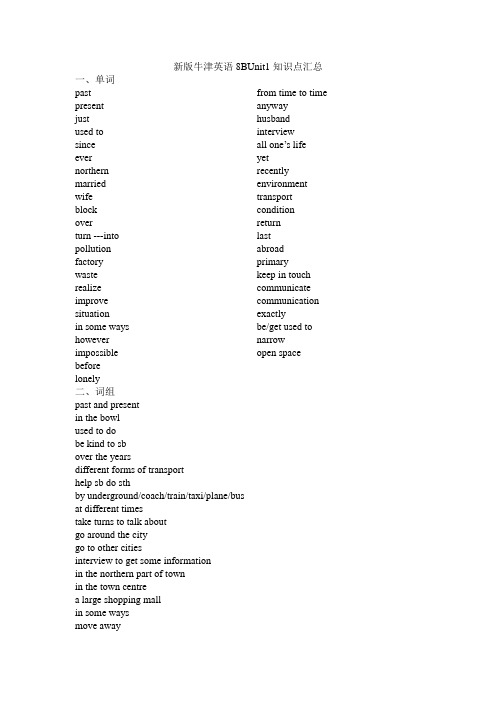
新版牛津英语8BUnit1知识点汇总一、单词past presentjustused to sinceever northern marriedwifeblockoverturn ---into pollution factory waste realize improve situationin some ways however impossible from time to time anyway husband interviewall one’s lifeyetrecently environment transport conditionreturnlastabroadprimarykeep in touch communicate communication exactlybe/get used to narrowopen spacebeforelonely二、词组past and presentin the bowlused to dobe kind to sbover the yearsdifferent forms of transporthelp sb do sthby underground/coach/train/taxi/plane/bus at different timestake turns to talk aboutgo around the citygo to other citiesinterview to get some informationin the northern part of townin the town centrea large shopping mallin some waysmove awaythe meaning of the wordsbecause of being alonea group of buildings with streets on all sidesthe history of Sunshine Townall his lifeon my ownnarrow and dirty roadsgreen trees on both sidesenjoy a comfortable lifein some large open spaceshave their own cars三、句型1.It was in the bowl an hour ago.2.Have you seen my food?3.I’ve just eaten it.4.You have changed. You used to share my food with me.5.You used to be so kind to me.6.How did you go to school when you were a student?7.Why didn’t you take a bus?8.There were too many people on the bus, and it took a long time to wait for thenext one.9.Times have changed.10.I have lived there since I was born.11.Have you ever moved house?12.When I got married in 1965, my wife and I moved to two blocks away and we’velived in this area since then.13.Has the town changed a lot over the years?14.The government has turned part of the town centre into a new park.15.Was pollution a problem then?16.There was once a steel factory near the Sunshine River.17.They often put the waste into the river.ter the government realized the problem and took action to improve thesituation.19.Now the river is much clearer.20.Do you think life is better now?21.It’s really nice to have a beautiful modern town.22.It has become impossible for us to see each other as often as before.23.We used to play cards and Chinese chess together.24.Now I feel a bit lonely from time to time.25.Anyway, it’s good to see the amazing changes in the town.26.Tell me about your interview with Mr Chen. `27.What was the town like in the past?28.Have you seen any films recently?29.It’s about the changes in Beijing over the past century.30.Mr Li has repaired over ten bicycles since Monday.31.Do you plan to see it again?32.She went abroad with her parents.33.You were still primary school then.34.We mainly communicate by email.35.The Internet makes communication much easier.36.The new shopping mall is a good place to have fun.37.A river runs through the centre of town.38.It is not easy to get used to the changes of life quickly.39.I have to spend more time on my homework than before.40.Many changes have taken place in Moonlight Town over the years.四、语法(现在完成时)1、基本机构主语+have/has done sth2、动词变化规则+ed finshed+d changed-y+ied carried双写+ed stopped不变come-come hurt-hurthold-held win-wonlend-lent build-builtcatch-caught keep-kept forget-forgotten tell-toldbe-been have-had fall-fallen fly-flown draw-drawn see-seenmake-made hit-hit put-put meet-met make-made sell-sold give-given write-written think-thought visit-visited live-lived repair-repaired move-moved try-tried study-studied fit-fitted plan-planned。
(完整word版)新版牛津译林8B_Unit1单词词组和语法讲解

牛津译林8B Unit1一、同步知识梳理知识点1:past and present(P6)(1)pastn. 过去,以前;in the past 在过去adj. 过去的,以前的;in the past few years 在过去的几年里prep. 经过 walk past the post office走过邮局【例句】In the past, there was no underground in Nanjing。
Let’s not make the past mistakes.When I walk past the post office, I see a bird flying over the tree.(2)presentadj。
现在的;目前的;出席的n。
现在; 礼物; at present 现在 ; a present for you=a gift for you给你的礼物vt。
介绍;出现; 提出;赠送;【例句】Everyone can be present ed a present at present。
知识点2:You’ve changed, Eddie. You used to share food with me。
(P6) 你变了。
你以前跟我分享食物的。
(1)change: vt./vi. 改变,变更; change into变成n.变化,改变;change(s) to ..。
的变化【例句】Great changes to Nanjing have taken place.(2)use n。
用途; 使用能力; 运用头脑(或身体)的能力;vt。
用,使用; 行使,【常用短语】①used to (do sth.) “过去常常(做某事)"批注: 否定形式:didn’t use to / usedn't to②get/be used to(doing sth. )“习惯于(做某事)【例句】He used to go fishing every Saturday。
牛津8B-Unit1知识点归纳、难点解析、语法复习
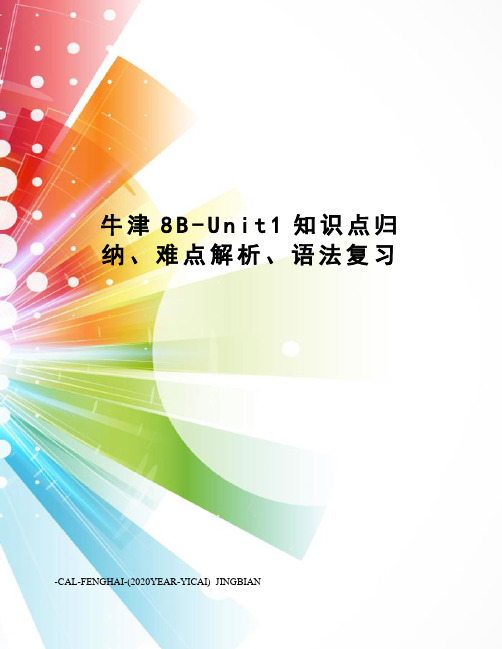
牛津8B-U n i t1知识点归纳、难点解析、语法复习-CAL-FENGHAI-(2020YEAR-YICAI)_JINGBIAN8B Unit 1 Past and present【短语学习重点】1.an hour ago 一小时前2.not play with you any more 不再和你一起玩3.not…any more = no more = not … any longer = no longer 不再,再也不……4.in the southern part of town 在南部的镇上5.live together till 1965 住在一起直到1965年6.at different times 在不同的时代7.know the city very well 对这所城市非常了解8.(A and B)get married A和B结婚9. A be married to B A和B结婚(延续)10.move to another flat 搬到另外一所公寓11.in the center of town 在镇中心12.change a lot 变化大13.in the past 在过去14.turn/change the place into a park 变成公园15.at weekends 在周末16.play cards and Chinese chess 打牌,下中国象棋17.a shoe factory 一家鞋厂18.water pollution 水污染19.pollute the river 污染河流ed to do sth 过去常常做某事21.dump its waste into the river 把它的废水倒入河里22.the government realized it was a very serious problem政府意识到它是一个非常严重的问题23.take action to reduce the pollution 采取措施来减少污染24.in some ways 在某些方面25.have open space and pretty gardens拥有开放的空间和漂亮的花园26.move out of …搬出……27.feel a bit lonely 感觉有点孤单28.from time to time/at times 不时/有时29.make me very happy 使得我很开心30.move out of the city 搬出这所城市31.because of +名词因为…..32.be lucky enough to see the changes足够幸运地看到变化33.a few times 几次34.miss my friends 想念我的朋友35.see/enjoy the exhibition 看/喜欢展览36.decide to do sth 决定做某事37.since last week 自从上周以来38.for a whole week 整个一星期39.by the way 顺便说40.hear from her 收到她的来信41.travel by plane 乘飞机旅行42.own a boat 拥有一条船43.in fact 事实上44.in the sitting room 在起居室45.a real one 一个真的46.in service 在服务中47.in the past and the present 在过去和现在48.take me to school 带我去学校49.on my own/by myself/alone 独自/单独50.in primary school 在小学ed to be 过去常常是52.a lot more people 更多的人53.change a lot 改变了许多54.why not do sth 为什么不做某事55.since he was born 自从他出生后56.since last Friday 自从上周五57.move into new flats 搬进新公寓58.over the years 在几年间59.have more free time 有更多的空闲时间60.have time to relax more 有时间多放松【句型学习重点】1.Have you seen my food 你见了我的食物了吗2.I’ve known the place for many years. 我了解这个地方已经许多年了。
牛津8B-Unit1知识点归纳、难点解析、语法复习
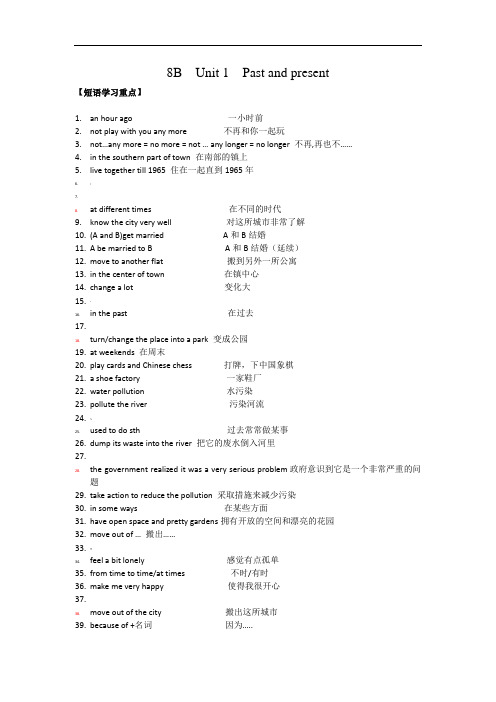
8B Unit 1 Past and present【短语学习重点】1.an hour ago 一小时前2.not play with you any more 不再和你一起玩3.not…any more = no more = not … any longer = no longer 不再,再也不……4.in the southern part of town 在南部的镇上5.live together till 1965 住在一起直到1965年6.:7.8.at different times 在不同的时代9.know the city very well 对这所城市非常了解10.(A and B)get married A和B结婚11.A be married to B A和B结婚(延续)12.move to another flat 搬到另外一所公寓13.in the center of town 在镇中心14.change a lot 变化大15.`16.in the past 在过去17.18.turn/change the place into a park 变成公园19.at weekends 在周末20.play cards and Chinese chess 打牌,下中国象棋21.a shoe factory 一家鞋厂22.water pollution 水污染23.pollute the river 污染河流24.~ed to do sth 过去常常做某事26.dump its waste into the river 把它的废水倒入河里27.28.the government realized it was a very serious problem政府意识到它是一个非常严重的问题29.take action to reduce the pollution 采取措施来减少污染30.in some ways 在某些方面31.have open space and pretty gardens拥有开放的空间和漂亮的花园32.move out of …搬出……33.*34.feel a bit lonely 感觉有点孤单35.from time to time/at times 不时/有时36.make me very happy 使得我很开心37.38.move out of the city 搬出这所城市39.because of +名词因为…..40.be lucky enough to see the changes足够幸运地看到变化41.@42. a few times 几次43.miss my friends 想念我的朋友44.see/enjoy the exhibition 看/喜欢展览45.decide to do sth 决定做某事46.47.since last week 自从上周以来48.for a whole week 整个一星期49.by the way 顺便说50.`51.hear from her 收到她的来信52.travel by plane 乘飞机旅行53.own a boat 拥有一条船54.in fact 事实上55.in the sitting room 在起居室56.57. a real one 一个真的58.<59.in service 在服务中60.in the past and the present 在过去和现在61.take me to school 带我去学校62.on my own/by myself/alone 独自/单独63.in primary school 在小学ed to be 过去常常是65.66. a lot more people 更多的人67.)68.change a lot 改变了许多69.why not do sth 为什么不做某事70.since he was born 自从他出生后71.since last Friday 自从上周五72.move into new flats 搬进新公寓73.over the years 在几年间74.have more free time 有更多的空闲时间75.76.|77.have time to relax more 有时间多放松【句型学习重点】1.Have you seen my food 你见了我的食物了吗2.I’ve known the place for many years. 我了解这个地方已经许多年了。
上海牛津英语8BUnit1_知识点梳理--彭三彭胜娟
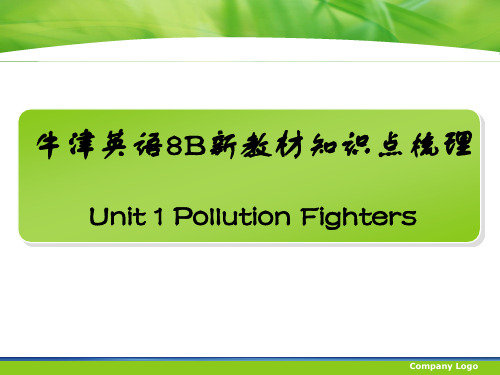
Unit 1 Pollution Fighters
Company Logo
Vocabulary
1.live v. 生活 adj. living adj. alive
有生命的 活着的
living things keep your whole class /us alive
Vocabulary
9.Everyone must help to fight against __________ pollution to make our earth clean. (pollute) 10.We can _________ breathe fresh oxygen with the help of trees. (breath) 11.People cut down and burn millions of trees, but they _________ replace hardly any of them. (place) 12.The factory releases _________ harmful gases into the air and pollutes the environment seriously. (harm) 13.The trees can protect themselves by producing a nasty __________. chemical (chemistry) 14.It’s not good of you to write or draw something on the __________ wooden desks. (wood) 15.I’m ________ really sorry for not knowing a lot about trees. (real) 16.Trees can _____________ communicate with each other underground. (communication)
牛津英语 8BUnit1 期末复习重点
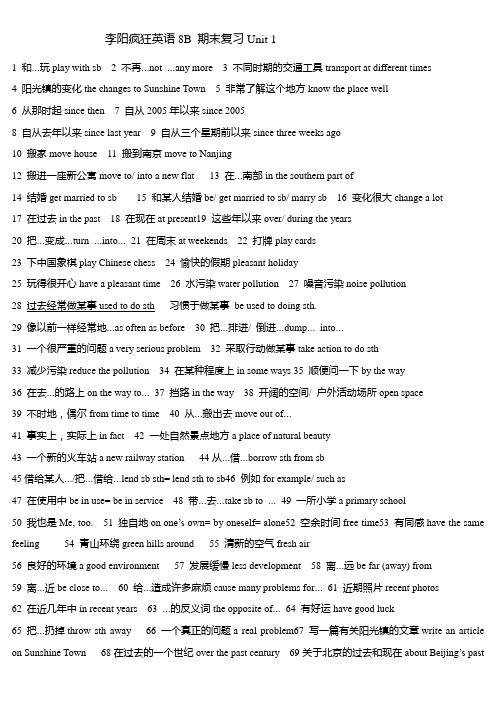
李阳疯狂英语8B 期末复习Unit 11 和…玩play with sb2 不再…not …any more3 不同时期的交通工具transport at different times4 阳光镇的变化the changes to Sunshine Town5 非常了解这个地方know the place well6 从那时起since then7 自从2005年以来since 20058 自从去年以来since last year 9 自从三个星期前以来since three weeks ago10 搬家move house 11 搬到南京move to Nanjing12 搬进一座新公寓move to/ into a new flat 13 在…南部in the southern part of14 结婚get married to sb 15 和某人结婚be/ get married to sb/ marry sb 16 变化很大change a lot17 在过去in the past 18 在现在at present19 这些年以来over/ during the years20 把…变成…turn …into…21 在周末at weekends 22 打牌play cards23 下中国象棋play Chinese chess 24 愉快的假期pleasant holiday25 玩得很开心have a pleasant time 26 水污染water pollution 27 噪音污染noise pollution28 过去经常做某事used to do sth 习惯于做某事be used to doing sth.29 像以前一样经常地…as often as before 30 把…排进/ 倒进…dump…into…31 一个很严重的问题a very serious problem 32 采取行动做某事take action to do sth33 减少污染reduce the pollution 34 在某种程度上in some ways 35 顺便问一下by the way36 在去…的路上on the way to…37 挡路in the way 38 开阔的空间/ 户外活动场所open space39 不时地,偶尔from time to time 40 从…搬出去move out of…41 事实上,实际上in fact 42 一处自然景点地方a place of natural beauty43 一个新的火车站a new railway station 44从…借…borrow sth from sb45借给某人…/把…借给…lend sb sth= lend sth to sb46 例如for example/ such as47 在使用中be in use= be in service 48 带…去…take sb to …49 一所小学a primary school50 我也是Me, too. 51 独自地on one’s own= by oneself= alone52 空余时间free time53 有同感have the same feeling 54 青山环绕green hills around 55 清新的空气fresh air56 良好的环境a good environment 57 发展缓慢less development 58 离…远be far (away) from59 离…近be close to…60 给…造成许多麻烦cause many problems for…61 近期照片recent photos62 在近几年中in recent years 63 …的反义词the opposite of…64 有好运have good luck65 把…扔掉throw sth away 66 一个真正的问题a real problem67 写一篇有关阳光镇的文章write an article on Sunshine Town 68在过去的一个世纪over the past century 69关于北京的过去和现在about Beijing’s pastand present70收到某人的来信hear from sb= receive a letter from71乘飞机旅行travel by plane/ by air 72享受阳光和沙滩enjoy the sun and the beach8B Unit 21到…作一次旅行go on a trip to…2 一定很有趣must be great fun 3带…出去几天take …out for a few days 4 把…带在身边bring sth with sb 5 快点;加油come on 6 旅游景点tourist attractions7 …的象征a symbol of…8 去滑雪go skiing 9 去远足go hiking10 看美丽的风景see the beautiful view11 拍take photos 12 欢迎到…welcome to…13 写信给…write to sb14 玩得很高兴have a fantastic time15 整天the whole day 16 乘地铁by underground 17 在入口处at the entrance18 高速运行move at high speed 19 一家快餐店a fast food restaurant 20 对…感兴趣be interested in21 不停地拍照can’t stop taking photos 22 迪斯尼人物的游行a parade of Disney characters23 下午晚些时候later in the afternoon24 一天中最精彩的部分the best part of the day25 向…挥手致意wave to …26 一路上all the way 27 像魔术一样be like magic28 精彩的狮王表演the great ‘Lion King’ show 29 买一些纪念品buy some souvenirs30 在…结束时at the end of…31 观看烟火watch fireworks32 在烟火映衬下看起来很闪亮look shiny and beautiful under the fireworks33 一共,总计in all 34 一次刺激的旅行an exciting trip 35 把某物给某人看show sth to sb36 一队人a line of people 37 排队等候wait in line 38 一次有意义的经历a meaningful experience39 一次真得令人高兴的假日a really delightful holiday 40 多姿多彩的服饰colourful costumes41 …一名成员a member of…42 到深圳旅游travel to Shengzhen 43 全年all year around44 在即将到来的假日in the coming holiday45 依次/轮流做某事take turns to do sth46 计划出国旅游plan to travel abroad 47 希望做某事hope to do sth48 希望某人做某事wish sb to do sth49 飞往某地fly to …50 新鲜的空气fresh air 51 宜人的天气pleasant weather52 名胜古迹places of interest53 我们去香港旅游的日子the day of our trip to Hongkong54 三个半小时three and a half hours= three hours and a half55 鸟瞰香港的景色have a bird’s-eye view of Hongkong56 一座高楼耸立、夜晚灯光闪烁的现代化城市a modern city of tall buildings with lights shining in the evening57 文化中心cultural centre。
牛津八年级下册Unit 1知识重点

8BUnit 1 知识重点整理归纳1. 过去和现在past and present2. 一小时前an hour ago3. 你看见我的食物了吗?Have you seen my food?4. 我刚刚吃了它。
I’ve just eaten it.5. 你吃了我的食物?You’ve eaten my food?6. 你过去常常和我分享食物的。
You used to share food with me.7. 过去常常做某事used to do sth.8. 和某人分享某物share sth. with me9. 你过去对我很友好。
You used to be kind to me.10. 对某人友好be kind/nice/friendly to sb.11. 骑自行车去上学go to school by bike12. 乘公共汽车take a bus13. 太多的人too many people14. 等下一班车花了很长时间。
It took a long time to wait for the next one.15. 方便快捷easy and fast16. 不时,有时,偶尔from time to time1. 非常了解.... know a lot about....=know .....very well2. 自从我出生我就住这儿了。
I’ve lived here since I was born.3. 在城镇的北部in the northern part of town/in the north of town4. 结婚get married5. 搬到两个街区以外move two blocks away6. 自从那时since then7. 改变许多change a lot8. 近几年/在这些年间over the years9. 在镇中心in the town centre10. 把镇中心的一部分变成一个新公园turn part of the town centre into a new park11. 把……变成…… turn...into12. 污染问题 a pollution problem13. 一家钢铁厂 a steel factory14. 往河里排放废弃物put the waste into the river15. 意识到这个问题realize the problem16. 采取行动做某事take action to do sth.17. 改善情况improve the situation18. 干净的多much cleaner19. 在某种程度上是这样的in some ways it is20. 拥有一个美丽现代的城镇have a beautiful modern town21. 我大多数老朋友most of my old friends22. 搬走move away23. 看到彼此see each other24. 和以前一样经常as often as before25. 过去经常一起打牌used to play cards together26. 下中国象棋play Chinese chess27. 感到有点孤单feel a bit(a little) lonely28. 不时,有时,偶尔from time to time/at times/sometimes29. 小镇的令人惊叹的变化the amazing changes in the town30. A与B结婚 A marry B = A get married to B=A and B get married31. 某人把A嫁给B sb marry A to BP141. 过去的一个世纪over the past century2. 对于北京的过去与现在我了解了更多。
牛津译林版英语八年级下册-8B-Unit1-知识点总结汇总
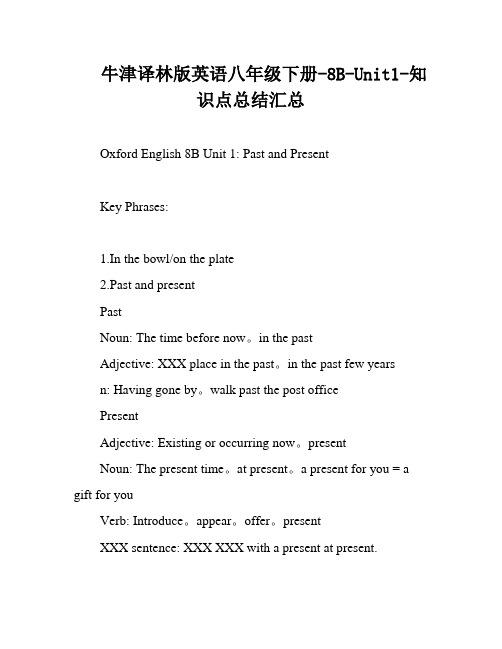
牛津译林版英语八年级下册-8B-Unit1-知识点总结汇总Oxford English 8B Unit 1: Past and PresentKey Phrases:1.In the bowl/on the plate2.Past and presentPastNoun: The time before now。
in the pastAdjective: XXX place in the past。
in the past few yearsn: Having gone by。
walk past the post officePresentAdjective: Existing or occurring now。
presentNoun: The present time。
at present。
a present for you = a gift for youVerb: Introduce。
appear。
offer。
presentXXX sentence: XXX XXX with a present at present.ed to do something。
Used to be + adjective/noun。
There used to be + nounUsed to do something: Past XXXNegative form: Used not to do something or didn't use to do somethingn form: Did someone use to do something。
or Used someone to do something?4.Be used to doing something。
Be used to something。
Get/e used to doing something/somethingNote: XXX is used to do something = Something is used for doing something (passive voice)5.Since thenSince has several meanings: (1) Since。
牛津8B Unit1 重点知识梳理
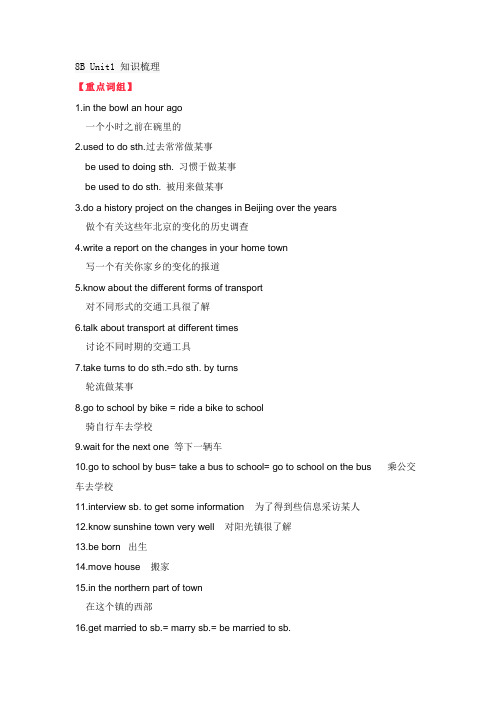
8B Unit1 知识梳理【重点词组】1.in the bowl an hour ago一个小时之前在碗里的ed to do sth.过去常常做某事be used to doing sth. 习惯于做某事be used to do sth. 被用来做某事3.do a history project on the changes in Beijing over the years做个有关这些年北京的变化的历史调查4.write a report on the changes in your home town写一个有关你家乡的变化的报道5.know about the different forms of transport对不同形式的交通工具很了解6.talk about transport at different times讨论不同时期的交通工具7.take turns to do sth.=do sth. by turns轮流做某事8.go to school by bike = ride a bike to school骑自行车去学校9.wait for the next one 等下一辆车10.go to school by bus= take a bus to school= go to school on the bus 乘公交车去学校11.interview sb. to get some information 为了得到些信息采访某人12.know sunshine town very well 对阳光镇很了解13.be born 出生14.move house 搬家15.in the northern part of town在这个镇的西部16.get married to sb.= marry sb.= be married to sb.和某人结婚17.marry sb. to sb. 把某人嫁给某人18.move two blocks away搬到两个街区以外19.live in this area 住在这个地区20.since then 自从那以后since I was born/ since last Saturday/since three days ago 21.over the years 这些年over the past century 在过去的几个世纪22.in the town centre= in the centre of the town 在镇中心23.turn/change/put sth. into 把某物变成某物24.a steel factory 一个钢铁厂25.put the waste into the river 把垃圾倒入河里put down 记下put away 收好put on 穿上put off 推迟、延期26.take action to improve the situation采取行动改善这种情况27.in some ways 在某些方面on the way (to ) 在……的路上by the way 顺便说no way 没门in any way 无论如何28.most of my old friends大部分我的老朋友29.move away 搬走/move to(into) another town30.see each other as often as before像以前一样经常看到对方31.play cards and Chinese chess 打牌和下棋32.feel a bit lonely 感到有点孤单33.from time to time = at times = sometimes 有时34.because of being alone 因为独自一人35.a group of buildings with streets on all sides街道两边全是高楼on both sides/ on each side36.interview sb.= have an interview with sb. 采访某人37.all his life 整个他的一生38.in the past 在过去at present 现在39.make some notes 做些笔记40.waste sth. on sth./ sb.浪费某物在某物/某人上41.repair over ten bicycles= repair more than ten bicycles修理超过10辆自行车42.teach sb. a lot about the history of China教我很多有关中国的历史43.talk about a film about the history of Beijing讨论一个有关北京历史的影片44.learn more about Beijing’s past and present对北京的过去和现在了解更多45.hear about/of 听说hear from sb.= receive/ get one’s letter=receive/get a letter of sb.收到某人来信46.living conditions 居住条件47.return sth. to sb. 把某物归还给某人48.go abroad 去国外at home or abroad 在国内外49.at primary school 在小学50.keep in touch with each other 互相保持联系51.make communication much easier使得联系更容易communicate with sb.和某人保持联系52.take place发生(有目的有计划的)、举行happen发生(偶然发生)53.green hills all around到处都是绿山54.a river runs through the centre of town一条小河穿过镇中心55.get used to the changes of life习惯了生活的变化56.on one’s own = by oneself = alone独自57.throw rubbish 扔垃圾58.in some large open spaces在一些大的开阔的地方59.move into new flats搬到新公寓去60.in their free time在他们业余时间61.travel around the town在镇里转转62.have their own cars= have cars of their own有他们自己的汽车e the new words to talk about my hometown用些新词来讨论我的家乡e facts to support my opinions用事实来支持我的观点【重点句型】1.There were always too many people on the bus, and it took a long time to wait for the next one.公共汽车上总是有太多的人,并且要花费很长时间等待下一趟。
- 1、下载文档前请自行甄别文档内容的完整性,平台不提供额外的编辑、内容补充、找答案等附加服务。
- 2、"仅部分预览"的文档,不可在线预览部分如存在完整性等问题,可反馈申请退款(可完整预览的文档不适用该条件!)。
- 3、如文档侵犯您的权益,请联系客服反馈,我们会尽快为您处理(人工客服工作时间:9:00-18:30)。
8B Unit 1一.精选词汇㈠重点短语1. the changes to Sunshine Town阳光镇的变化→the changes to……的变化 (p8)〈知识链接〉change n.变化,常用复数changes。
e.g. Great changes have taken place since 1995.2. in the southern part of town →in the southern part of…在…的南部→south →southern〈知识链接〉east东部→eastern东部的, west →western, north →northern3. in the past在过去→at present现在→in the future未来;将来,注意这些短语中的介词和冠词。
4. turn the place into a park →turn…into…把…变成…〈知识链接〉①Heat turns water into vapor.热使水变成蒸气。
②Turn this sentence into English.5. play cards and Chinese chess打牌、下象棋,e.g. It’s pleasant to play cards and Chinese chess.6. water pollution水污染→air pollution空气污染,noise pollution噪音污染 (p9)〈知识链接〉Water pollution was a problem before.7. used to dump its waste into water →used to do sth过去常做某事,注意否定式、疑问式的形式〈知识链接〉⑴used to do sth →否定式used not to do sth或didn’t use to do sth→疑问式Did sb use to do sth?或Used sb to do sth? ⑵There be和used to合用的形式为There used to be。
根据要求进行句型转换:She used to teach history. ①否定式:She used teach history.或She didn’t teach history. ②疑问式: she teach history?或Did she teach history?〈用法拓展〉⑴be used to do sth=be used for doing sth被用于做某事,e.g. Stamps are used to send letters.=Stamps are used for sending letters. ⑵be/become/get used to sth习惯于某事,be/become/get used to doing sth习惯于做某事,e.g. ①My grandma used to live in the city but now she has got used to the country life. ②Tom is used to getting up early.8. in some ways在某种程度上;在某些方面→in this way以这种方式9. feel a bit lonely from time to time →from time to time=at times=sometimes有时;不时地〈知识链接〉⑴a bit+形容词原级或比较级=a little+形容词原级或比较级,有点…⑵a bit of+不可数名词=a little+不可数名词 e.g. a bit of water=a little water 〈用法拓展〉not a little=very非常,not a bit=not…at all一点也不10. throw away扔掉…→“动词+副词”结构,e.g. throw it/them away11. have an interview with sb=interview sb采访某人;对某人面试;与某人面谈 (p12)〈知识链接〉①My parents have had an interview with my teacher. ②They interviewed 20 peoplefor the job. ③There are a number of interviews with some famous football players.12. the best model I have ever seen 我曾见过的最好的模型 (p17)〈知识链接〉the+形容词最高级+名词单数+sb have/has ever done,某人曾做过的最…的…the most wonderful film (that) he has ever watched他看过的最精彩的比赛〈用法拓展〉⑴ever通常用于疑问句中或否定句中。
e.g. ①Have/Has sb ever done sth?②Nobody ever stepped in this cavern.没人曾经踏进过这洞穴。
⑵ever since…自从…起到现在(用于现在完成时),for ever=forever永远;永久地13. move into the new flats→move into…搬进…,move out of…搬出… (p18)14. lend me a book→lend sb sth=lend sth to sb把某物借给某人,是“借出”。
〈知识链接〉borrow sth from sb向某人借某物,是“借入”。
15. a recent photo一张近期照片,write about the changes to Moonlight Town (p21)16. a tourist attraction旅游胜地→attraction n. 吸引;向往的地方→attract vt.吸引→attractive 有吸引力的①It has become a new tourist attraction. ②Hepburn’s beauty and charm attracted Colette’s attention.㈡词汇解析1. 常见的交通工具:bike/bicycle, bus, double-decker双层巴士, coach长途汽车, tram有轨电车, taxi, train, underground, light rail轻轨, plane, hot-air balloon热气球, aero done滑翔机2. Using a dictionary: The words in a dictionary are in alphabetical order from “A” to “Z”. This helps us find the words we want quickly. If two words starts with the same letter, we look at the second letter to decide the alphabetical order. If the first two letters of two words are the same, we look at the third letter, and so on. e.g. The word “ball” comes before the word “banana”.3. century=one hundred years世纪;百年。
⑴某世纪用序数词。
如:21世纪the twenty-first century。
⑵“在某世纪”用介词in,如:in the 20th century在20世纪。
二. 重点句型1. —Eddie, have you seen my food? —Yes, I’ve just eaten it. (p6)2. You’ve changed, Eddie. You were kind. Now you’re not. I don’t want to play with you any more.3. You’ve changed too. You always wanted to play with me. →always+过去式=used to do sth4. Coaches have been in use/service in Beijing since 1958. →have been in use=have been used5. I moved here with my family when I was two years old and have lived here since then. (p8)6. Have you ever moved house? →move house搬家7. We lived till 1965, when I got married. →get married结婚→get/be married to sb与某人结婚〈知识链接〉⑴marry sb与某人结婚,e.g. She married a football player. ⑵marry sb to sb把某人嫁给某人,e.g. He married his daughter to an actor. ⑶get/be married to sb和某人结婚,e.g. Yao Ming got married to Ye Li on 6 August, 2007. ⑷表示“已经结婚”用have/has got married,表示“已经结婚多久”用have/has been married for+时间段或since+时间点。
e.g. ①They have got married. ②They have been married for 5 years.不能说成They have got married for 5 years.〈用法拓展〉marriage n.婚姻e.g. They will celebrate their fifty years of marriage next month.8. Has Sunshine Town changed a lot over the years? →change a lot变化大〈知识链接〉over the years=in the last/past years这些年来,这是现在完成时的一个标志。
